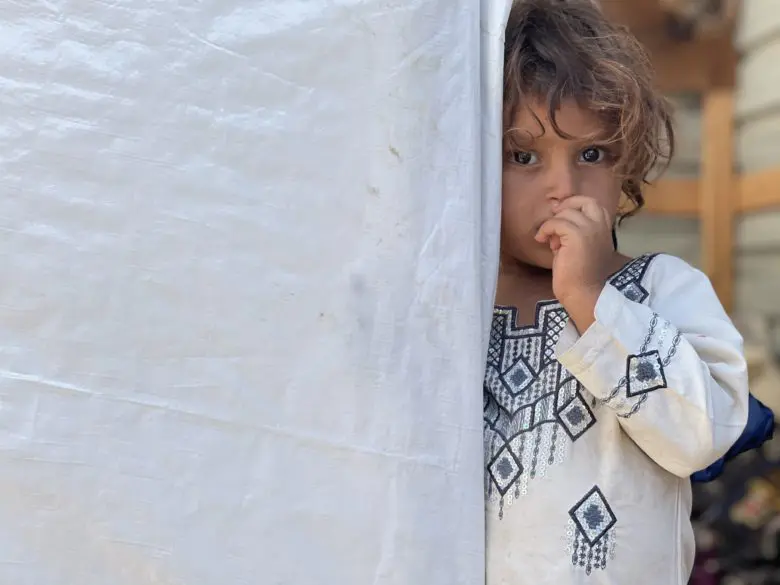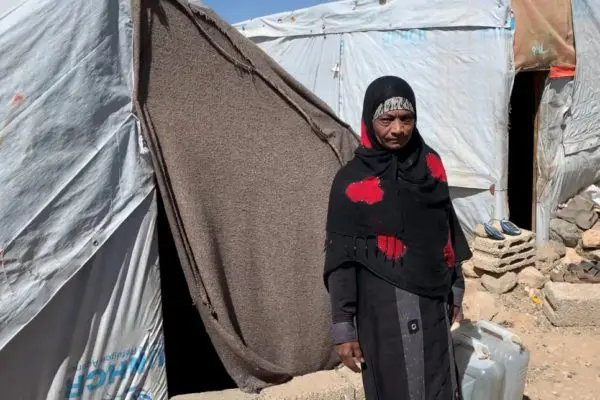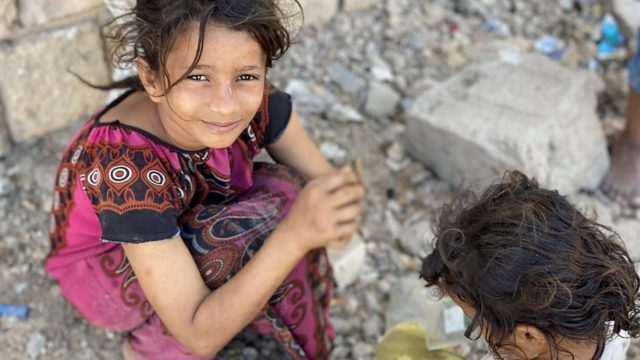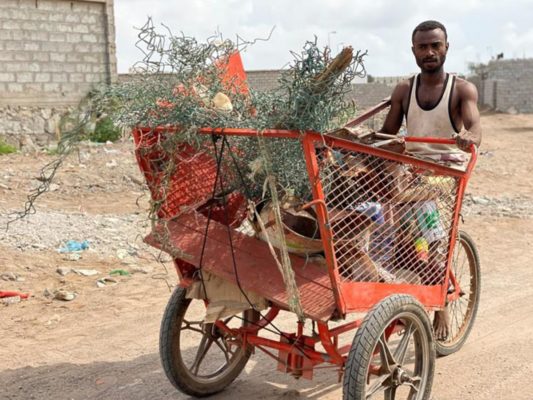
Umaimah, an internally displaced Yemeni girl, stands at the door of the makeshift shelter she shares with her parents and five siblings at a site in Al Khawkhah, Taiz, in Yemen. © UNHCR/Marie-Joëlle Jean-Charles
Hundreds of thousands face heightened risk of food insecurity in Yemen.
By Jean-Nicolas Beuze, as told to Lauren La Rose
The country that is home to the world’s worst humanitarian crisis is facing growing challenges. There is heightened risk of food insecurity in Yemen, which is prevalent in areas of conflict where half of Yemen’s four million displaced people live. UNHCR Yemen Representative Jean-Nicolas Beuze shares his insights and provides an update from the ground.
What are the factors that are driving food insecurity in Yemen?
The intensifying conflict and the fuel embargo have made the Yemeni economy collapse and prices of food and other commodities skyrocket. Even prior to the COVID-19 pandemic, we assessed that 80 percent of the Yemeni population was relying on humanitarian aid for their daily survival. If it is difficult for Yemeni families to find their bread and butter under these circumstances, you can well imagine that families displaced by the conflict – one out of eight Yemeni – are particularly at risk of hunger. Having lost their homes and their livelihoods, they struggle to make ends meet.
DONATE TO SUPPORT YEMENI REFUGEES
What are the resources and supplies you need more urgently right now to help address food insecurity?
Our cash assistance program targeting the most vulnerable displaced families is the most dignified way of helping Yemenis protect themselves from the famine. We know from our assessments that 97 percent of those receiving our cash use a portion of it to buy food – mostly rice, sometimes onions or tomatoes, and bread. We also know – and this is extremely worrisome – that without our cash, most families will cut their spending on health care, education and products for newborns. Many parents told us they would stop eating to make sure their children have something.
“Most families will cut their spending on health care, education and products for newborns.”
You have previously described the challenges for refugees and internally displaced people accessing basic essentials during the pandemic. How are you helping people in need cope with the ongoing public health emergency?
Refugees, mainly from Somalia, and local families displaced by the conflict are amongst the poorest in Yemen. When the COVID-19 pandemic hit the country, they were already struggling to buy food, pay rent or send their children to schools. With the slowing down of the economy, they were the first to lose their jobs in the informal sector. Being displaced requires daily impossible choices: to eat or to keep a roof above a family’s head. Under such extreme circumstances, buying medicines or soaps can only be but deprioritized. Deaths are a daily occurrence in these communities where other communicable diseases are also spreading, from cholera to malaria. Many have told me that they do not have the means to bring sick relatives to a health facility and would not have the means to pay for medicine. Again, our cash program increases the choices they can make.
“Being displaced requires daily impossible choices: to eat or to keep a roof above a family’s head.”
According to the International Organization for Migration, some 172,000 people were newly displaced in Yemen during 2020. What kind of support has UNHCR and its partners been able to provide to these individuals and their families?
UNHCR is at the forefront of the immediate response for these families who have recently lost everything in the conflict. Our first line of response is twofold: emergency shelter to protect them from the elements and cash for families to buy food. You cannot imagine how having a shelter is critical for women or children to be protected against risks in the communities; for persons with disabilities to retain a bit of dignity; and, for older persons who long for a safe and private space as they struggle with the ailments of aging. Unfortunately, I must be frank: it is difficult to get sufficient funding to deliver these emergency shelters in a timely manner and of sufficient quality to last.
What are some of the key priority areas of focus for UNHCR to further help refugees and internally displaced people in Yemen in 2021?
For Yemenis displaced by the conflict our top priorities remain cash and shelter, while other humanitarian partners focus on other aspects of the response. UNHCR, however, is the sole agency taking care of the 130,000 refugees in the country. From food to health care or education, refugees have little or no access to public services: they rely on us for their survival.
What can Canadians do to continue to support UNHCR in its efforts to help people in need in Yemen?
Continue supporting us, UNHCR, and other humanitarian partners, in Yemen and elsewhere as every loonie matters. COVID-19 showed us that nobody will be safe without everyone of us being safe.
Being here on the ground, and being confronted with challenges that seem insurmountable, is, I will be honest, sometimes disheartening. Knowing that Canadians are behind us, however, give us all strength to continue going the extra mile to make the difference in the lives of millions of displaced Yemenis and Somali refugees. I know that we can count on you to stand with us as we deliver life-saving interventions in Yemen.
“COVID-19 showed us that nobody will be safe without everyone of us being safe.”





